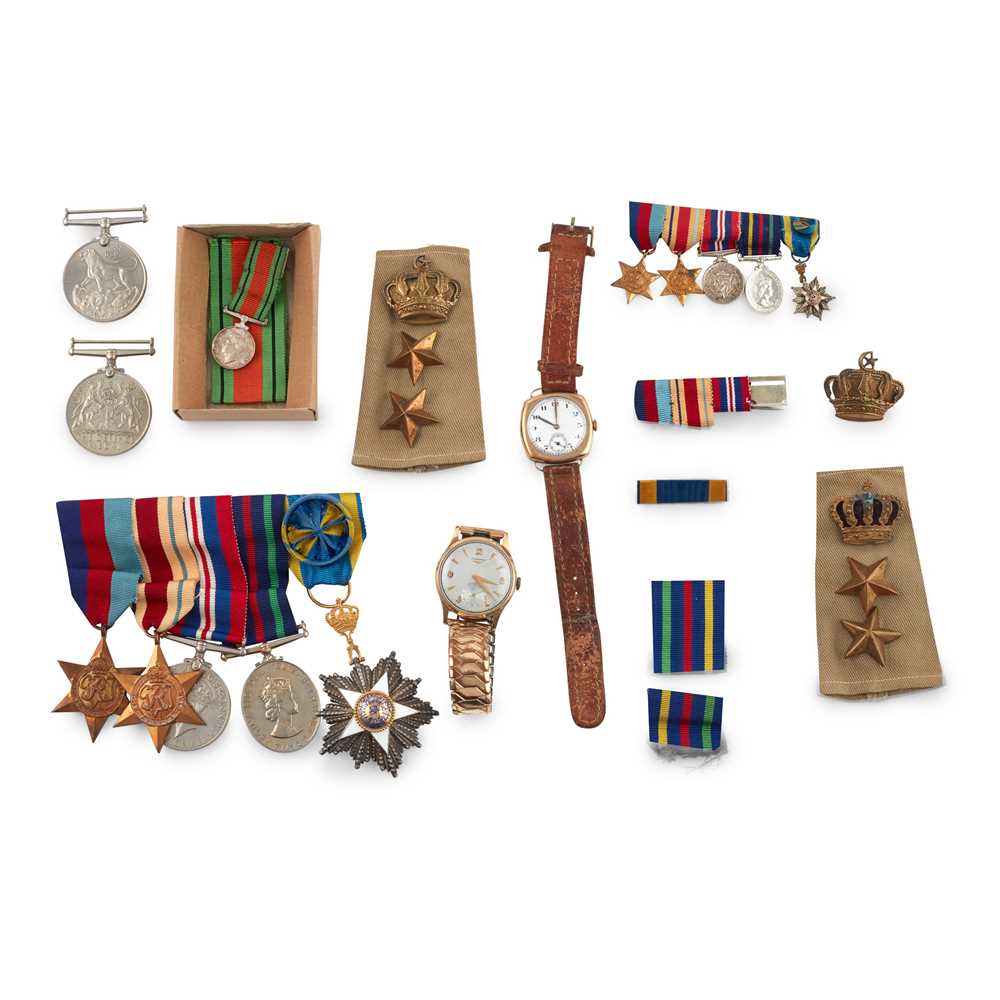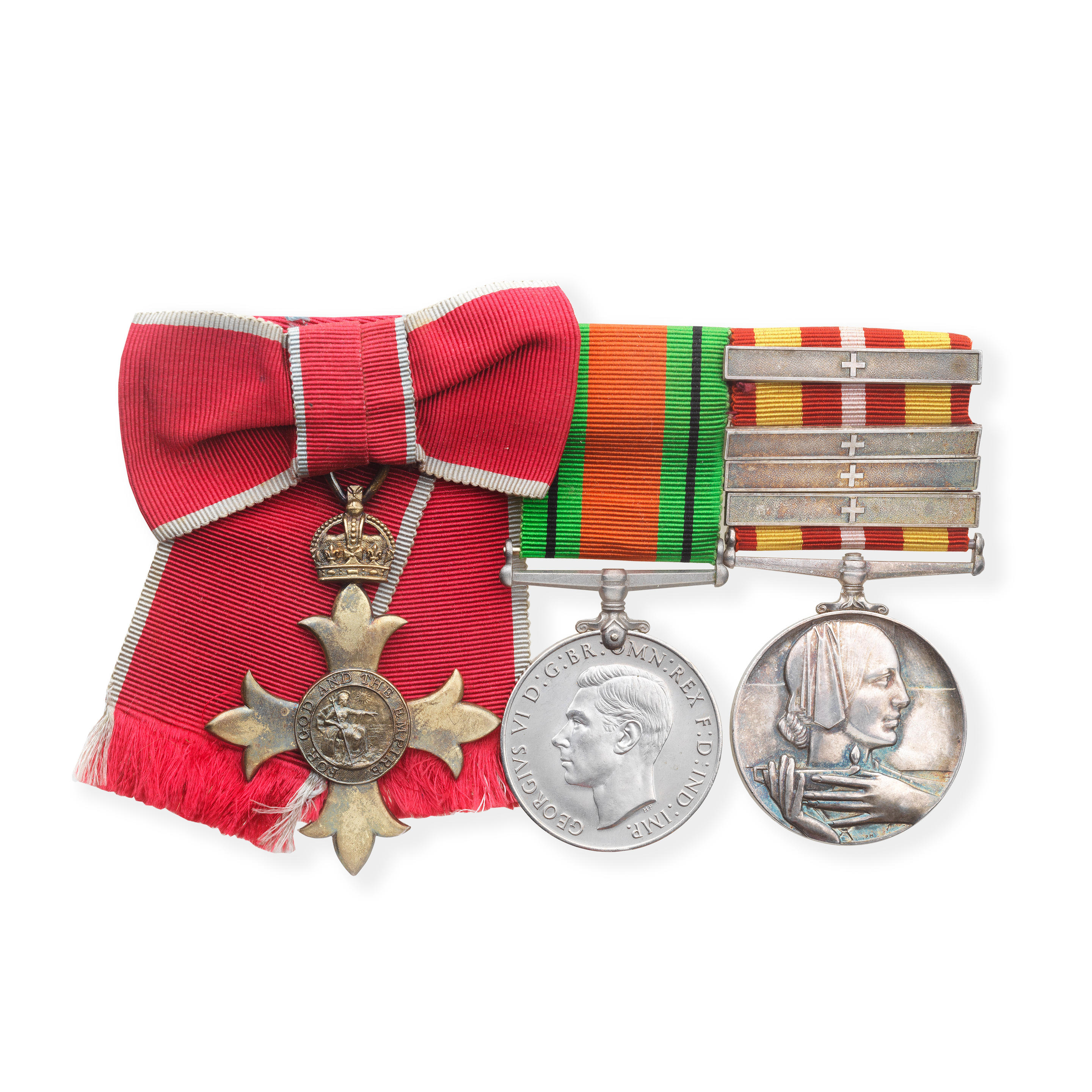Family group: A civil C.B. group of four awarded to Sir Friston Charles How, formerly a Lieutenant in the Royal Marines The Most Honourable Order of the Bath, C.B. (Civil) Companion’s neck badge, silver-gilt, hallmarks for London 1947, with neck cravat and evening collar, in Garrard, London case of issue; British War and Victory Medals (Lieut., R.M.) in (damaged) named card box of issue; Coronation 1953, unnamed, in card box of issue; together with a mounted set of four miniature dress medals Pair: Worker Ann Stewart Hunter, Queen Mary’s Army Auxiliary Corps, latterly Lady Ann How British War and Victory Medals (97 Wkr. A. S. Hunter, Q.M.A.A.C.) in (damaged) named card boxes of issue, extremely fine (10) £300-400 Footnote Friston Charles How was born on 17 September 1897, the only child of Charles Friston and Jane Ethel How, of Leytonstone. Educated at County High School for Boys, Leyton and London University gaining a B.Sc. He joined the H.A.C. in 1916 and was commissioned into the Royal Marines in 1917. With them he served in France, 1917-18, being demobilized in 1919. After the war, employed as a Civil Servant, he served in the Exchequer and Audit Department, 1920 and H.M. Inspector of Taxes, 1920-37. He was Called to the Bar, Middle Temple, 1927. He then served in the Air Ministry, 1937-40; M.A.P., 1940-45; and Ministry of Supply, 1946-53. In 1948 he was awarded the C.B. He was Secretary of the Atomic Energy Office, 1954-59 and was Knighted in 1958 and retired in 1959. Was a Member of the Air Transport Advisory Council, 1960-61 and the Air Transport Licensing Board, 1960-70. Latterly living at Prasmohr, Birse, Aboyne, Aberdeenshire; he died on 15 January 1990. In 1932 Friston Charles How married Ann Stewart Hunter, the eldest daughter of Alexander Chisholm Hunter, of Aberdeen. Lady How died in 1985.
Family group: A civil C.B. group of four awarded to Sir Friston Charles How, formerly a Lieutenant in the Royal Marines The Most Honourable Order of the Bath, C.B. (Civil) Companion’s neck badge, silver-gilt, hallmarks for London 1947, with neck cravat and evening collar, in Garrard, London case of issue; British War and Victory Medals (Lieut., R.M.) in (damaged) named card box of issue; Coronation 1953, unnamed, in card box of issue; together with a mounted set of four miniature dress medals Pair: Worker Ann Stewart Hunter, Queen Mary’s Army Auxiliary Corps, latterly Lady Ann How British War and Victory Medals (97 Wkr. A. S. Hunter, Q.M.A.A.C.) in (damaged) named card boxes of issue, extremely fine (10) £300-400 Footnote Friston Charles How was born on 17 September 1897, the only child of Charles Friston and Jane Ethel How, of Leytonstone. Educated at County High School for Boys, Leyton and London University gaining a B.Sc. He joined the H.A.C. in 1916 and was commissioned into the Royal Marines in 1917. With them he served in France, 1917-18, being demobilized in 1919. After the war, employed as a Civil Servant, he served in the Exchequer and Audit Department, 1920 and H.M. Inspector of Taxes, 1920-37. He was Called to the Bar, Middle Temple, 1927. He then served in the Air Ministry, 1937-40; M.A.P., 1940-45; and Ministry of Supply, 1946-53. In 1948 he was awarded the C.B. He was Secretary of the Atomic Energy Office, 1954-59 and was Knighted in 1958 and retired in 1959. Was a Member of the Air Transport Advisory Council, 1960-61 and the Air Transport Licensing Board, 1960-70. Latterly living at Prasmohr, Birse, Aboyne, Aberdeenshire; he died on 15 January 1990. In 1932 Friston Charles How married Ann Stewart Hunter, the eldest daughter of Alexander Chisholm Hunter, of Aberdeen. Lady How died in 1985.




/112174/Internet%20Image%201.jpg)


/113326/Internet%20Image%201.jpg)







Testen Sie LotSearch und seine Premium-Features 7 Tage - ohne Kosten!
Lassen Sie sich automatisch über neue Objekte in kommenden Auktionen benachrichtigen.
Suchauftrag anlegen